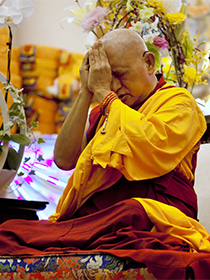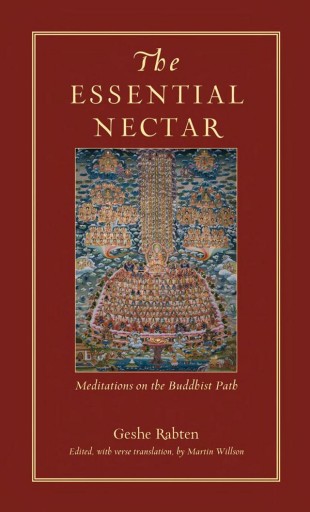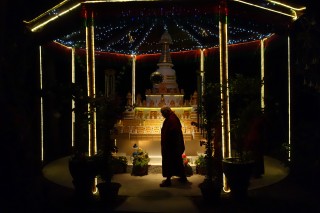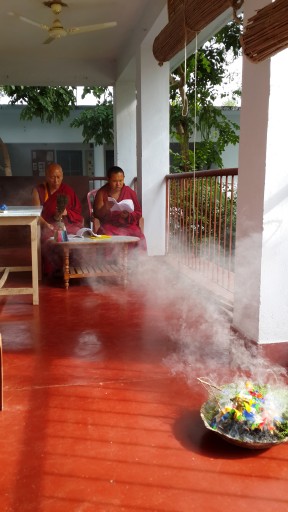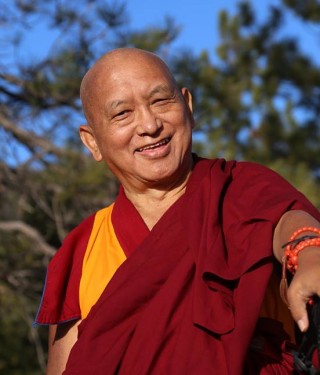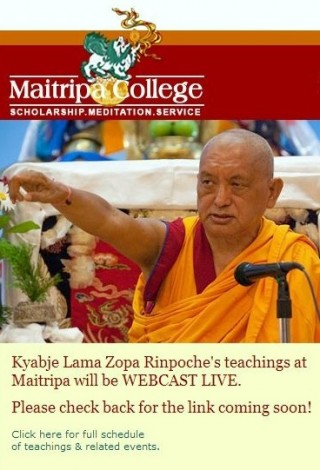- Home
- FPMT Homepage
Foundation for the Preservation of the Mahayana Tradition
The FPMT is an organization devoted to preserving and spreading Mahayana Buddhism worldwide by creating opportunities to listen, reflect, meditate, practice and actualize the unmistaken teachings of the Buddha and based on that experience spreading the Dharma to sentient beings. We provide integrated education through which people’s minds and hearts can be transformed into their highest potential for the benefit of others, inspired by an attitude of universal responsibility and service. We are committed to creating harmonious environments and helping all beings develop their full potential of infinite wisdom and compassion. Our organization is based on the Buddhist tradition of Lama Tsongkhapa of Tibet as taught to us by our founders Lama Thubten Yeshe and Lama Thubten Zopa Rinpoche.
- Willkommen
Die Stiftung zur Erhaltung der Mahayana Tradition (FPMT) ist eine Organisation, die sich weltweit für die Erhaltung und Verbreitung des Mahayana-Buddhismus einsetzt, indem sie Möglichkeiten schafft, den makellosen Lehren des Buddha zuzuhören, über sie zur reflektieren und zu meditieren und auf der Grundlage dieser Erfahrung das Dharma unter den Lebewesen zu verbreiten.
Wir bieten integrierte Schulungswege an, durch denen der Geist und das Herz der Menschen in ihr höchstes Potential verwandelt werden zum Wohl der anderen – inspiriert durch eine Haltung der universellen Verantwortung und dem Wunsch zu dienen. Wir haben uns verpflichtet, harmonische Umgebungen zu schaffen und allen Wesen zu helfen, ihr volles Potenzial unendlicher Weisheit und grenzenlosen Mitgefühls zu verwirklichen.
Unsere Organisation basiert auf der buddhistischen Tradition von Lama Tsongkhapa von Tibet, so wie sie uns von unseren Gründern Lama Thubten Yeshe und Lama Thubten Zopa Rinpoche gelehrt wird.
- Bienvenidos
La Fundación para la preservación de la tradición Mahayana (FPMT) es una organización que se dedica a preservar y difundir el budismo Mahayana en todo el mundo, creando oportunidades para escuchar, reflexionar, meditar, practicar y actualizar las enseñanzas inconfundibles de Buda y en base a esa experiencia difundir el Dharma a los seres.
Proporcionamos una educación integrada a través de la cual las mentes y los corazones de las personas se pueden transformar en su mayor potencial para el beneficio de los demás, inspirados por una actitud de responsabilidad y servicio universales. Estamos comprometidos a crear ambientes armoniosos y ayudar a todos los seres a desarrollar todo su potencial de infinita sabiduría y compasión.
Nuestra organización se basa en la tradición budista de Lama Tsongkhapa del Tíbet como nos lo enseñaron nuestros fundadores Lama Thubten Yeshe y Lama Zopa Rinpoche.
A continuación puede ver una lista de los centros y sus páginas web en su lengua preferida.
- Bienvenue
L’organisation de la FPMT a pour vocation la préservation et la diffusion du bouddhisme du mahayana dans le monde entier. Elle offre l’opportunité d’écouter, de réfléchir, de méditer, de pratiquer et de réaliser les enseignements excellents du Bouddha, pour ensuite transmettre le Dharma à tous les êtres. Nous proposons une formation intégrée grâce à laquelle le cœur et l’esprit de chacun peuvent accomplir leur potentiel le plus élevé pour le bien d’autrui, inspirés par le sens du service et une responsabilité universelle. Nous nous engageons à créer un environnement harmonieux et à aider tous les êtres à épanouir leur potentiel illimité de compassion et de sagesse. Notre organisation s’appuie sur la tradition guéloukpa de Lama Tsongkhapa du Tibet, telle qu’elle a été enseignée par nos fondateurs Lama Thoubtèn Yéshé et Lama Zopa Rinpoché.
Visitez le site de notre Editions Mahayana pour les traductions, conseils et nouvelles du Bureau international en français.
Voici une liste de centres et de leurs sites dans votre langue préférée
- Benvenuto
L’FPMT è un organizzazione il cui scopo è preservare e diffondere il Buddhismo Mahayana nel mondo, creando occasioni di ascolto, riflessione, meditazione e pratica dei perfetti insegnamenti del Buddha, al fine di attualizzare e diffondere il Dharma fra tutti gli esseri senzienti.
Offriamo un’educazione integrata, che può trasformare la mente e i cuori delle persone nel loro massimo potenziale, per il beneficio di tutti gli esseri, ispirati da un’attitudine di responsabilità universale e di servizio.
Il nostro obiettivo è quello di creare contesti armoniosi e aiutare tutti gli esseri a sviluppare in modo completo le proprie potenzialità di infinita saggezza e compassione.
La nostra organizzazione si basa sulla tradizione buddhista di Lama Tsongkhapa del Tibet, così come ci è stata insegnata dai nostri fondatori Lama Thubten Yeshe e Lama Zopa Rinpoche.
Di seguito potete trovare un elenco dei centri e dei loro siti nella lingua da voi prescelta.
- 欢迎 / 歡迎
简体中文
“护持大乘法脉基金会”( 英文简称:FPMT。全名:Foundation for the Preservation of the Mahayana Tradition) 是一个致力于护持和弘扬大乘佛法的国际佛教组织。我们提供听闻,思维,禅修,修行和实证佛陀无误教法的机会,以便让一切众生都能够享受佛法的指引和滋润。
我们全力创造和谐融洽的环境, 为人们提供解行并重的完整佛法教育,以便启发内在的环宇悲心及责任心,并开发内心所蕴藏的巨大潜能 — 无限的智慧与悲心 — 以便利益和服务一切有情。
FPMT的创办人是图腾耶喜喇嘛和喇嘛梭巴仁波切。我们所修习的是由两位上师所教导的,西藏喀巴大师的佛法传承。
繁體中文
護持大乘法脈基金會”( 英文簡稱:FPMT。全名:Found
ation for the Preservation of the Mahayana Tradition ) 是一個致力於護持和弘揚大乘佛法的國際佛教組織。我們提供聽聞, 思維,禪修,修行和實證佛陀無誤教法的機會,以便讓一切眾生都能 夠享受佛法的指引和滋潤。 我們全力創造和諧融洽的環境,
為人們提供解行並重的完整佛法教育,以便啟發內在的環宇悲心及責 任心,並開發內心所蘊藏的巨大潛能 — 無限的智慧與悲心 – – 以便利益和服務一切有情。 FPMT的創辦人是圖騰耶喜喇嘛和喇嘛梭巴仁波切。
我們所修習的是由兩位上師所教導的,西藏喀巴大師的佛法傳承。 察看道场信息:
- FPMT Homepage
- News/Media
-
- Study & Practice
-
-
- About FPMT Education Services
- Latest News
- Programs
- New to Buddhism?
- Buddhist Mind Science: Activating Your Potential
- Heart Advice for Death and Dying
- Discovering Buddhism
- Living in the Path
- Exploring Buddhism
- FPMT Basic Program
- FPMT Masters Program
- FPMT In-Depth Meditation Training
- Maitripa College
- Lotsawa Rinchen Zangpo Translator Program
- Universal Education for Compassion & Wisdom
- Online Learning Center
-
- Prayers & Practice Materials
- Overview of Prayers & Practices
- Full Catalogue of Prayers & Practice Materials
- Explore Popular Topics
- Benefiting Animals
- Chenrezig Resources
- Death & Dying Resources
- Lama Chopa (Guru Puja)
- Lama Zopa Rinpoche: Compendium of Precious Instructions
- Lama Zopa Rinpoche: Life Practice Advice
- Lama Zopa Rinpoche Practice Series
- Lamrim Resources
- Mantras
- Prayer Book Updates
- Purification Practices
- Sutras
- Thought Transformation (Lojong)
- Audio Materials
- Dharma Dates - Tibetan Calendar
- Translation Services
- Publishing Services
- Ways to Offer Support
- Prayers & Practice Materials
-
- Teachings and Advice
- Find Teachings and Advice
- Lama Zopa Rinpoche Advice Page
- Lama Zopa Rinpoche: Compendium of Precious Instructions
- Lama Zopa Rinpoche Video Teachings
- ༧སྐྱབས་རྗེ་བཟོད་པ་རིན་པོ་ཆེ་མཆོག་ནས་སྩལ་བའི་བཀའ་སློབ་བརྙན་འཕྲིན།
- Podcasts
- Lama Yeshe Wisdom Archive
- Buddhism FAQ
- Dharma for Young People
- Resources on Holy Objects
- Teachings and Advice
-
-
*If a menu item has a submenu clicking once will expand the menu clicking twice will open the page.
-
-
- Centers
-
- Teachers
-
- Projects
-
-
-
-
*If a menu item has a submenu clicking once will expand the menu clicking twice will open the page.
-
-
- FPMT
-
-
-
-
-
Faith alone never stops problems; understanding knowledge-wisdom always does. Lord Buddha himself said that belief in Buddha was dangerous; that instead of just believing in something, people should use their minds to try to discover their own true nature.
Lama Thubten Yeshe
-
-
-
- Shop
-
-
-
The Foundation Store is FPMT’s online shop and features a vast selection of Buddhist study and practice materials written or recommended by our lineage gurus. These items include homestudy programs, prayers and practices in PDF or eBook format, materials for children, and other resources to support practitioners.
Items displayed in the shop are made available for Dharma practice and educational purposes, and never for the purpose of profiting from their sale. Please read FPMT Foundation Store Policy Regarding Dharma Items for more information.
-
-
Study & Practice News
20
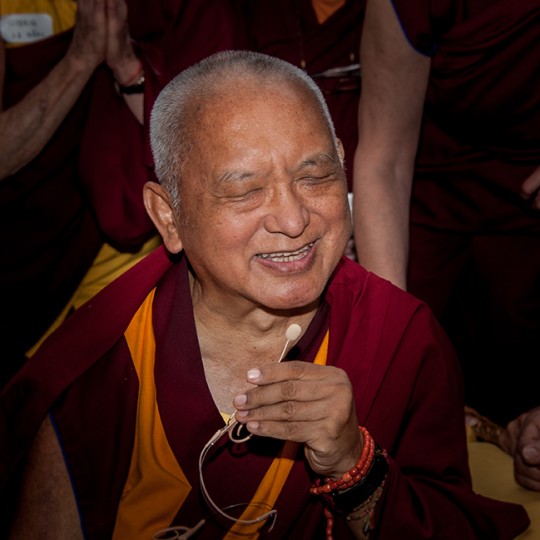
Lama Zopa Rinpoche speaking to the FPMT European Regional Meeting participants, Istituto Lama Tzong Khapa, Pomaia, Italy, June 17, 2014. Photo by Sirianni.
Lama Zopa Rinpoche gave advice on working for centers in May 2012 at Tushita Meditation Centre:
“Sometimes people who are working at centers only think of the problems – problems, problems, problems. Maybe it makes them feel sick. Their heart becomes very dry, very uninterested. [However,] if you know how to think, it’s really unbelievable. The highest merit is collected and there is the greatest purification by working for the center. Otherwise, you might think, ‘Oh, maybe I’ll go and work in the hospital, there’s much more merit from doing that.’ You see, when you don’t think of Dharma, when you completely forget that the Dharma is the only way to really benefit sentient beings, to liberate them from suffering, then you start thinking things like, ‘Oh, maybe I’ll go and help in a children’s camp, that’s more beneficial.’ People think like that.
“This is a recent letter that I wrote that I thought would be helpful for others:
“Thank you very, very much for working for the center, arranging facilities and so forth. The Dharma center is to benefit sentient beings, to free them from the oceans of samsaric suffering, all the sufferings, and bring them to enlightenment. So you working for the center means that. …”
Read the complete advice and find other advice from Rinpoche on fpmt.org.
More information, photos and updates about FPMT spiritual director Lama Zopa Rinpoche can be found on Rinpoche’s homepage. If you’d like to receive news of Lama Zopa Rinpoche via email, sign up to Lama Zopa Rinpoche News.
- Tagged: advice, lama zopa rinpoche
- 0
18
Reciting the Names of Buddhas for Great Benefit
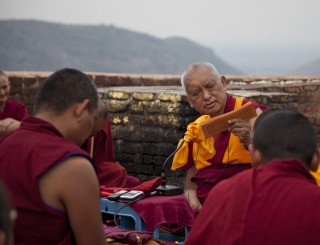
Lama Zopa Rinpoche giving the oral transmission of the
Vajra Cutter Sutra on Vulture’s Peak, Bihar, India, March 2014. Photo by Andy Melnic.
In response to a query by a student who was advised to sponsor a recitation of the Kangyur
(the teachings of Buddha) but could not afford it, Lama Zopa Rinpoche dictated two
powerful names of buddhas to recite. By reciting these names one receives the same benefit of having read the Kangyur and of having read and listened to all the Buddha’s teachings of sutra and tantra.
You can download this practice for free.
- Tagged: fpmt education services
11
The Essential Nectar Now Available
Wisdom Publications is happy to make available, after many years out of print, The Essential Nectar, translated by Martin Willson. The root text, by Yeshe Tsondru, is one of the 18 great Lam-rim texts. This book contains the root text and a commentary by Geshe Rabten, one of Lama Zopa Rinpoche’s gurus.
Lama Zopa Rinpoche recommends The Essential Nectar to be used in one’s daily Lam-rim meditation cycle. Rinpoche has offered advice about setting up a daily practice utilizing this text.
Exploring crucial points on the path to enlightenment, “Stages of the Path” literature continues to hold its place as one of the great treasures of Buddhist thought. In this volume, Geshe Rabten presents a structured explanation of the popular and practical text, The Essential Nectar of Holy Doctrine, by the eighteenth-century scholar Yeshe Tsöndrü. Geshe Rabten’s teachings reveal how we may see life’s great value and, by taking up the profound practice described herein, make the most of its abundant opportunity.
The FPMT Foundation Store is delighted to carry this most precious book.
- Tagged: essential nectar
4
New Advice from Lama Zopa Rinpoche
FPMT Education Services is pleased to release two new essential advices from Lama Zopa Rinpoche:
Lama Zopa Rinpoche’s Advice on Circumambulation is a short practice that can be done to make one’s practice of circumambulating holy objects as powerful as possible.
Lama Zopa Rinpoche’s Advice on Guru Devotion is a short and poetic composition in which Lama Zopa Rinpoche outlines the essence of guru devotion, including a beautiful dedication.
Both of these new advices are vailable through the FPMT Foundation Store as free downloads.
- Tagged: circumambulation
28
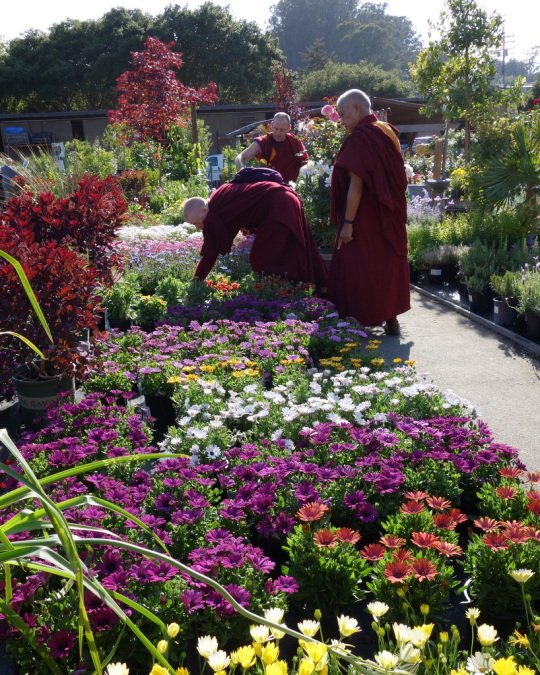
Rinpoche choosing flowers for offerings, Aptos, California, May 2014. Photo by Ven. Roger Kunsang.
“The purpose of having this precious human body is not simply to achieve happiness for oneself, but to eliminate the suffering of all other beings and to bring them happiness as well,” Lama Zopa Rinpoche instructs in his book Transforming Problems Into Happiness, published by Wisdom Publications. “This is the purpose of each of our lives. This human body is precious because with it you have the capacity and opportunity to pursue spiritual development in order to serve other living beings.
“Everyone wants happiness; no one wants suffering. The happiness we need is not just ordinary, fleeting happiness; what we really need is ultimate happiness, the unsurpassed, unshakable happiness of enlightenment. When people go shopping, for example, they want the things that are the best, that will last the longest; in the same way, everyone wants the longest-lasting, highest happiness. According to their understanding of what level of happiness is achievable, everyone attempts to obtain whatever is, in their view, the highest happiness.
“The Buddha’s teachings, called the Dharma, tell us the highest happiness achievable is enlightenment. The only reason anyone would not want to achieve enlightenment is that they lack Dharma wisdom. Lacking Dharma wisdom means simply being unaware that there exists a happiness higher than ordinary happiness. Anyone who has encountered the Dharma and studied it sincerely knows that one can be liberated from the bondage of suffering and can experience peerless happiness, that one can put an end to all obscurations, and that one can attain all the realizations of a buddha. Of course a person who knows these things can be achieved wants to achieve them. …”
You can read more from this excerpt on Wisdom Publication’s website.
More information, photos and updates about FPMT spiritual director Lama Zopa Rinpoche can be found on Rinpoche’s homepage. If you’d like to receive news of Lama Zopa Rinpoche via email, sign up to Lama Zopa Rinpoche News.
- Tagged: happiness, lama zopa rinpoche, mandala
- 0
21
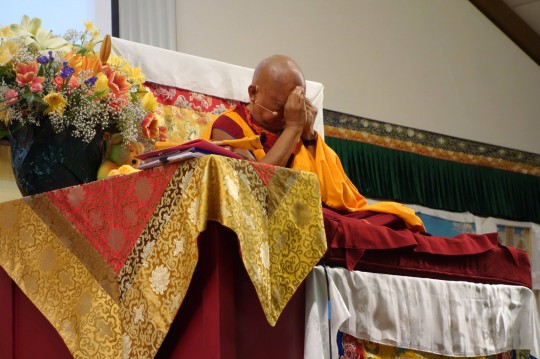
Lama Zopa Rinpoche teaching at the Light of the Path Retreat, Black Mountain, North Carolina, US, May 2014. Photo by Ven. Roger Kunsang.
Living in the Path, an FPMT study program, is continually evolving with course materials drawn from Lama Zopa Rinpoche’s “Light of the Path” retreat teachings, an annual event hosted by Kadampa Center in North Carolina, USA. The initial courses are organized around edited transcripts and short video clips from these teaching events.
FPMT Education Services is happy to announce we have a new free module available to you! The Seven Limb Prayer module is comprised of Lama Zopa Rinpoche’s precious teachings about the benefits related to each limb and how to practice each of the seven limbs in the most effective way. The seven-limb prayer is found in almost every practice text, particularly those related to guru yoga. This concise and powerful method was taught by the Buddha as a means to accumulate merit and purify negativities, creating the causes for success in practice, service, and daily life.
These teachings are extracted from the Light of the Path Retreat, September 2010, and from a letter of personal advice from Lama Zopa Rinpoche to a student dictated in March 2012.
To Access the Free Seven Limb Prayer Module (LP Instruction 03)
1. Go to the Online Learning Center website.
2. If this is your first time using the site, you will need to create a login account for accessing the Online Learning Center. Instructions on how to do this can be found in the “Getting Started Guide.”
3. If you already have a login account, or after you have created a new account, you can then enroll in LP Instruction 03 using the enrollment key of: preliminary07
4. You can access the course here.
5. The “Getting Started Guide” also contains useful information on the technical requirements for the site, information on updating your profile and setting your user preferences and on navigation within the site.
6. Please contact the site administrator at onlineedu@fpmt.org if you have any questions or queries.
Please also note that as a Friend of FPMT at the Dharma Supporter level or higher, one can receive access to all programs and content on the Online Learning Center.
We hope you enjoy the online course!
7
Nolsang Incense Ritual Now Available!
FPMT Education Services is delighted to make available an important incense offering ritual (nolsang) which is a translation of Padmasambhava’s The Divine Blue Water Clearing Away Contamination. This practice has been made available at the request of Lama Zopa Rinpoche for students who need it.
The ritual is used to purify contaminations that arise from ignorance, broken commitments, disturbing thoughts and emotions, as well as a variety of other negativities which cause obstacles, illness and misfortunes to oneself, others and the environment.
Available in eBook, a4 and letter booklet formats.
- Tagged: fpmt education, incense ritual
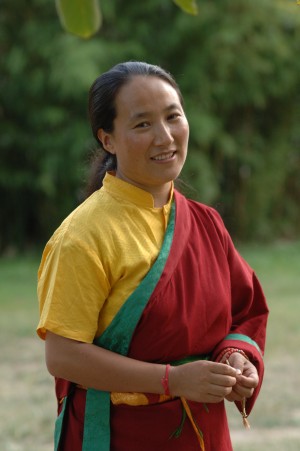
Khadro-la, August 2011. Photo by Philippe Garric.
Rangjung Neljorma Khadro Namsel Drönme first appeared to the international FPMT community through “Interview with a Dakini.” She’s since become known through the assistance she has been offering Lama Zopa Rinpoche since he manifested a stroke in 2011 and also through serving as an oracle at the Kalachakra initiation given by His Holiness the Dalai Lama in Bodhgaya, India, in January 2012. Here she talks about integrating lam-rim into daily life.
“In ordinary life, gaining wealth, food and shelter brings some pleasure at a physical level but not at a mental level. The worst suffering is mental suffering. Therefore, we have no choice but to learn how to transform such suffering. To do this, one needs to transform the mind. Wealth, rank and position can never handle or deal with mental suffering. Even having a large number of friends or guardians does not help because when faced with mental suffering, nothing can help except for mind-training.”
From Mandala October-December 2009.
Mandala brings you news and advice of Lama Zopa Rinpoche and of activities, teachings and events from over 160 FPMT centers, projects and services around the globe. If you like what you read on Mandala, consider becoming a Friend of FPMT, which supports our work.
- Tagged: khandro kunga bhuma
- 0
29
Light of the Path Retreat 2014, which takes place Sunday 3pm, May 4 to Sunday Noon, May 18, 2014, at YMCA Blue Ridge Assembly in Black Mountain, NC, is the third of a 5-year series of teaching retreats led by Lama Zopa Rinpoche based on Lama Atisha’s text, Lamp for the Path to Enlightenment.
You can enjoy all of these teachings in real time on live streaming video!
Please do take advantage of this opportunity to experience this retreat, even if you are unable to make it to North Carolina to attend in person.
Additionally, many resources and materials have been developed from the previous precious retreat teachings:
- All teachings from the 2009, 2010 and 2014 are available on the FPMT Online Learning Center.
- MP3 audio and mp4 video files are available for download in the Light of the Path Retreat Materials 2010: text, audio, video course. This course also contains the root text and other information associated with the retreat, including reviews, guided meditations, and the complete transcript of the retreat.
- The Living in the Path online program has been created from the Light of the Path retreat teachings of 2009 and 2010. Organized into structured modules you will find this, and other, programs on the FPMT Online Learning Center.
- Tagged: fpmt education services, light of the path
23
Calling the Guru from Afar
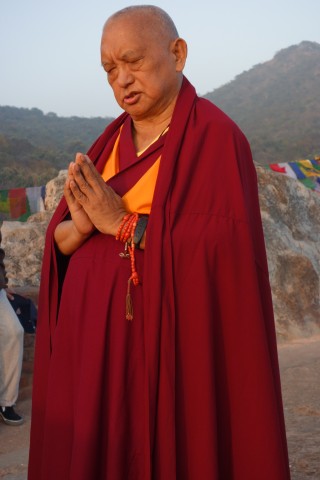
Lama Zopa Rinpoche does prostrations at Vulture’s Peak, the site of Buddha’s first teaching, India, February 2014. Photo by Ven. Roger Kunsang.
Calling the Guru from Afar is a heartfelt request for blessings to realize all the stages of the path to enlightenment, as well as a meditation on the nature of the guru.
FPMT Education Services is pleased to make available Lama Zopa Rinpoche chanting the long version of this prayer.
Also available as a free download is a practice booklet containing the long and short versions of Calling the Guru from Afar as well as Practicing Guru Devotion with the Nine Attitudes which is a short meditation that helps to develop the correct attitude toward one’s teacher.
The practice booklet is available in PDF & ebook format.
- Tagged: calling the guru from afar, fpmt education
18
All public portions of the Vajrasattva initiation and oral transmission will be webcast live courtesy of Maitripa College.
FPMT Education Services makes available materials needed for these practices, which you purchase online at the FPMT Foundation Store.
The Preliminary Practice of Vajrasattva contains the short and long practice of Vajrasattva as well as Vajrasattva tsog. It also contains commentary, retreat advice, altar set-up, and retreat preliminaries.
The Preliminary Practice of Dorje Khadro text by Lama Zopa Rinpoche provides everything one needs to be able to do the complete ngöndro of Dorje Khadro, the recitation of the principal mantra 100,000 times coupled with extensive visualization and prayers. The book’s practice section includes the Dorje Khadro practice text, Lama Tsongkhapa Guru Yoga and lam-rim and dedication prayers. In addition, the book contains teachings that contribute to a student’s understanding of how to best engage in this practice.
You can learn more about this teaching event schedule or register on the Maitripa website.
16
In 1975, FPMT founder Lama Yeshe explained why “meditation is simple” to a group of students in Bloomington, Indiana, United states. Mandala shared some of that teaching in the September-November 2002 issue:
Meditation is very simple. When hearing about meditation for the first time, you might think, “That must be very special; meditation couldn’t be for me but only for special people.” This just creates a gap between you and meditation.
Actually, watching television, which we all do, is a bit like meditating. When you watch television, you watch what’s happening on the screen; when you meditate, you watch what’s happening on the inner screen of your mind – where you can see all your good qualities, but all your inner garbage as well. That’s why meditation is simple.
The difference, however, is that through meditation you learn about the nature of your mind rather than the sense world of desire and attachment. Why is this important? We think that worldly things are very useful, but the enjoyment they bring is minimal and transient. Meditation, on the other hand, has so much more to offer – joy, understanding, higher communication and control. Control here does not mean that you are controlled by somebody else but rather by your own understanding knowledge-wisdom, which is a totally peaceful and joyful experience. Thus, meditation is very useful.
From Mandala September-November 2002
- Home
- News/Media
- Study & Practice
- About FPMT Education Services
- Latest News
- Programs
- New to Buddhism?
- Buddhist Mind Science: Activating Your Potential
- Heart Advice for Death and Dying
- Discovering Buddhism
- Living in the Path
- Exploring Buddhism
- FPMT Basic Program
- FPMT Masters Program
- FPMT In-Depth Meditation Training
- Maitripa College
- Lotsawa Rinchen Zangpo Translator Program
- Universal Education for Compassion & Wisdom
- Online Learning Center
- Prayers & Practice Materials
- Overview of Prayers & Practices
- Full Catalogue of Prayers & Practice Materials
- Explore Popular Topics
- Benefiting Animals
- Chenrezig Resources
- Death & Dying Resources
- Lama Chopa (Guru Puja)
- Lama Zopa Rinpoche: Compendium of Precious Instructions
- Lama Zopa Rinpoche: Life Practice Advice
- Lama Zopa Rinpoche Practice Series
- Lamrim Resources
- Mantras
- Prayer Book Updates
- Purification Practices
- Sutras
- Thought Transformation (Lojong)
- Audio Materials
- Dharma Dates – Tibetan Calendar
- Translation Services
- Publishing Services
- Teachings and Advice
- Find Teachings and Advice
- Lama Zopa Rinpoche Advice Page
- Lama Zopa Rinpoche: Compendium of Precious Instructions
- Lama Zopa Rinpoche Video Teachings
- ༧སྐྱབས་རྗེ་བཟོད་པ་རིན་པོ་ཆེ་མཆོག་ནས་སྩལ་བའི་བཀའ་སློབ་བརྙན་འཕྲིན།
- Podcasts
- Lama Yeshe Wisdom Archive
- Buddhism FAQ
- Dharma for Young People
- Resources on Holy Objects
- Ways to Offer Support
- Centers
- Affiliates Area
- Teachers
- Projects
- Charitable Projects
- Make a Donation
- Applying for Grants
- News about Projects
- Other Projects within FPMT
- Support International Office
- Projects Photo Galleries
- Give Where Most Needed
- FPMT
- Shop
Translate*
*powered by Google TranslateTranslation of pages on fpmt.org is performed by Google Translate, a third party service which FPMT has no control over. The service provides automated computer translations that are only an approximation of the websites' original content. The translations should not be considered exact and only used as a rough guide.Use problems as ornaments, seeing them as extremely precious, because they make you achieve enlightenment quickly, by getting you to achieve bodhicitta. Experience these problems on behalf of all sentient beings, giving all happiness to sentient beings. This is the ornament.







